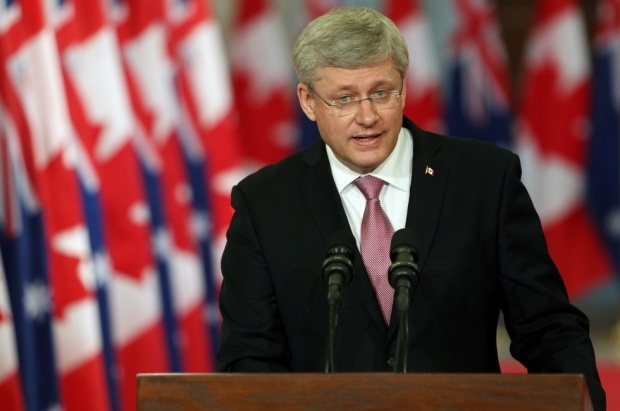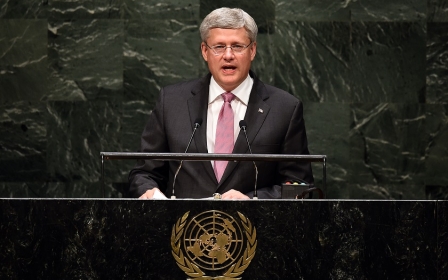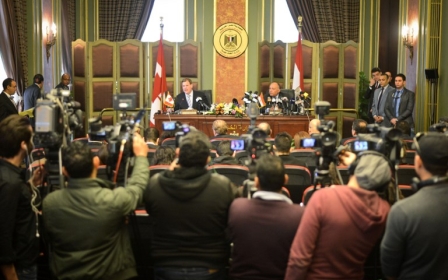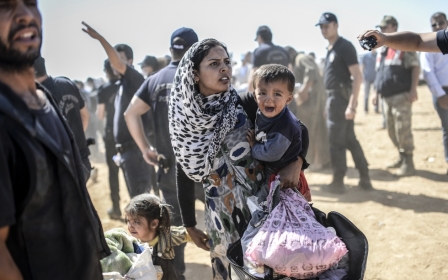Canada’s racialised militarism

Canada is prolonging its half-a-billion dollar war against the Islamic State (IS), an operation proposed and carried out by an administration hell-bent on casting the “international jihadist movement” as the nation’s top enemy. Despite no evidence to suggest that Muslim radicalisation and terrorism is on the rise in the western world, the Canada’s Stephen Harper-led Tory administration is adamant that staying safe in the 21st century means fighting vague wars abroad while implementing draconian security laws at home. Both of these agenda items depend on a certain kind of Manichaean militarism, where the image of the “jihadist” is often conflated with the rest of the Muslim community.
It is a convergence of foreign and domestic policy when it comes to how to fight the “war on terror”, all presented in the kind of rhetoric meant to galvanise the Conservative base leading up to this year’s federal election. The message to Canadians is that IS and its cousins must be fought and dealt with, yes, but so must their supporters who still live and breathe among ordinary people within Canadian borders. It’s an inquisitorial tone that has become a useful political weapon to vilify dissent against Harper’s political outlook.
In other words, there is a political process leading up to the election that seeks to exploit the current climate of fear engendered primarily by IS’s heinous crimes, not to mention images of recent, high-profile cases of domestic extremist attacks in Ottawa, Paris and Sydney. There’s also no doubt that the administration’s choice to engage in this kind of politicking skews and distorts certain debates that must take place in a robust way with regards to what the federal government is proposing. The controversy around Bill C-51 (the “Anti-terrorism Act”) is a good example of this public distortion. The bill is one of Canada’s most drastic attempts at mitigating terrorism in the post-9/11 era, and contains proposals that will, according to critics, erode Canadians’ civil liberties in ways that don’t really increase public safety. Nonetheless, its supporters keep pointing to the amorphous terrorism threat, keeping in mind that security issues will likely occupy the minds of voters this fall.
The government’s depiction of this “terrorism threat” often implies that extensive monitoring or policing of entire Muslim communities must be conducted, despite the fact that Canada’s own intelligence agencies seem to confirm the opposite. A 2011 study by the Canadian Security and Intelligence Service (CSIS) concluded that radicalisation of troubled Muslims does not tend to happen within public spaces like mosques or community centres. Instead, the process is highly individualised, noticeable only by friends or family. Regardless, by representing entire communities of Muslims as problematic, Harper’s team is simply cashing in on certain political realities. A recent public opinion poll conducted by the Angus Reid Institute shows that 44 percent of participating Canadians hold a “negative” view of Muslims, which must lend comfort to those who want to perpetuate the crude rhetoric underpinning Canada’s anti-Muslim militarism.
Moreover, public security isn’t the only arena within which this kind of rhetoric is allowed to flourish. There are many ways for Harper to supplement his administration’s handling of the security debate, primarily since that plenty of wedge issues can be used to misappropriate the Muslim presence in Canada. For example, Stephen Harper said in the House of Commons last month that the practice of wearing the Muslim face-veil (niqab) is “rooted in a culture that is anti-women”. Days later, Tory MP Larry Miller had to apologise after (on a radio programme) telling women who wear the niqab to “stay the hell where you came from”. Perhaps the most glaring gaffe goes to Defence Minister Jason Kenney, who decided to use International Women’s Day to tweet what he claimed are photographs of women being led off in chains by IS. It was later revealed that the photos had nothing to do with IS, and were actually depictions of Shiite Muslims commemorating the death of the Prophet’s family in a ceremony.
None of this political messaging is meant to clear up the cobwebs that cloud the public representation of Canadian Muslims and their beliefs. This is because such confusion allows certain parties to control the narrative surrounding Muslims in a way that antagonises those who don’t agree with the government’s security agenda.
The National Council of Canadian Muslims (NCCM), among other groups (Greenpeace Canada, the BC Civil Liberties Association, etc.) got a taste of this during last month’s highly inadequate parliamentary hearings on Bill C-51, when Executive Director Ihsaan Gardee had to reply to Conservative MP Dian Ablonczy’s question of whether his group supports terrorism. Ablonczy’s reference to a discredited rumour was meant to turn the focus of the discussion away from the bill itself into something else entirely. Instead, Muslims like Gardee are forced to defend against rhetoric and tactics that seeks to lump their community into the same ideological category as IS.
The demonisation of Muslims in Canada helps to reinforce the Tories’ anti-IS jingoism, but the reverse is also true. IS has provided the world with an almost perfect caricature of the post-9/11 “jihadist”, an image that’s easy to root against in a way that also helps to keep domestic dissent at bay. Canada’s version of this kind of public discourse has given rise to a post-9/11 militarism that isn’t slowing down any time soon.
- Steven Zhou is a regular contributor to Al Jazeera English, The American Conservative, Ricochet Media and Muftah, among other outlets. He also writes a regular column at The Islamic Monthly, where he's an associate editor. Follow him on Twitter @stevenzzhou
New MEE newsletter: Jerusalem Dispatch
Sign up to get the latest insights and analysis on Israel-Palestine, alongside Turkey Unpacked and other MEE newsletters
Middle East Eye delivers independent and unrivalled coverage and analysis of the Middle East, North Africa and beyond. To learn more about republishing this content and the associated fees, please fill out this form. More about MEE can be found here.





